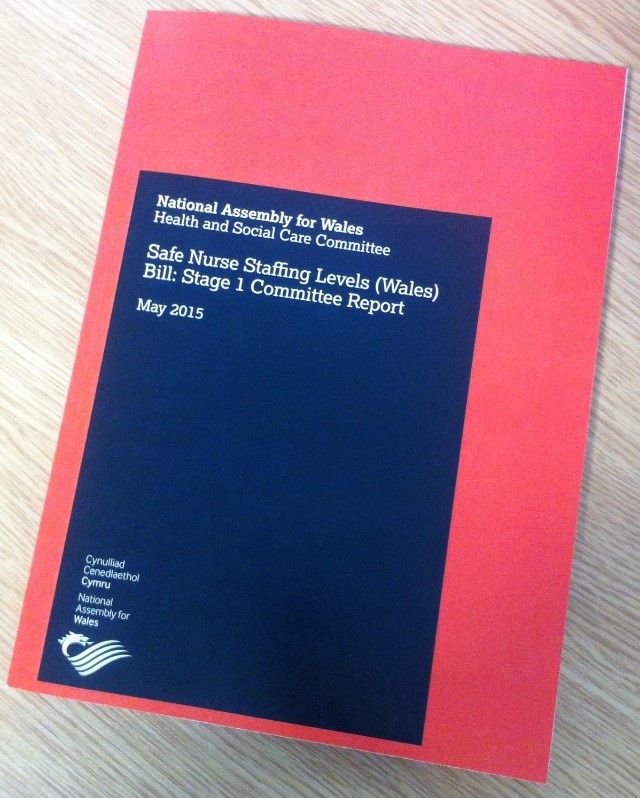Published 02/06/2015
| Last Updated 16/12/2024

The
Safe Nurse Staffing Levels (Wales) Bill’s main aim is to ensure that enough nurses are available to deliver safe nursing care for patients at all times. It was introduced by Kirsty Williams AM in December 2014 and has been considered by the
Health and Social Care Committee during the early months of 2015. We reported on the Bill in May 2015:
Safe Nurse Staffing Levels (Wales) Bill: Stage 1 Committee Report (PDF, 933KB)
The Assembly will consider this Bill in the
@SeneddChamber on 3 June. At the end of
the debate on the Bill, all Assembly Members will be asked to decide whether or not it should be allowed to progress to the next stages of scrutiny.
What does the Bill seek to do?
The Bill’s purpose is to require health service bodies to make sure that:
- there are enough nurses available to give safe care to patients all the time; and
- the management and planning of the nursing workforce in Wales is good, safe and efficient.
What did we think about the Bill?
Our job as a Committee at Stage 1 is to consider whether legislation is needed to deliver the aims set out by the Member who is responsible for the Bill, or whether there are better ways to do that.
To help us come to a conclusion on this question, we sought as many views as possible. We received
34 written responses and invited 32 individuals, including Kirsty Williams AM and the Minister for Health and Social Services, to provide
oral evidence in the Senedd.
After considering the range of evidence we received, including information from doctors, nurses, other health professionals and patients, we concluded that legislation could help improve the delivery of safe nurse staffing levels in Wales. While we unanimously supported the Bill’s aim, we made 19 recommendations we think should be implemented before the legislation is passed. Many of our recommendations focus on our concerns that the Bill could lead to a number of unintended consequences, not least the risk of diverting nursing staff from one hospital setting to another. We are also concerned that current nurse shortages may be a significant barrier to the successful implementation of the Bill’s provisions.
Our recommendations include:
- making sure that health bodies’ compliance with staffing ratios in "adult inpatient wards in acute hospitals" does not have an adverse effect on nurse staffing levels in other NHS settings in Wales;
- asking the Minister to ensure there is guidance in place to guard against the possible unintended consequences arising from this legislation;
- ensuring a balance between the use of permanent and temporary staff when complying with the staffing ratios;
- giving consideration to including reference to arrangements for comprehensive workforce planning on the face of the Bill, to ensure that sufficient numbers of trained nurses are available across public and independent sectors; and
- providing clarity about the settings to which the Bill will apply.
You can read our full list of recommendations, and the evidence that underpins the conclusions we have drawn, in our report:
Safe Nurse Staffing Levels (Wales) Bill: Stage 1 Committee Report (PDF, 933KB)
 What happens next?
What happens next?
If the Assembly agrees the general principles of the Bill on 3 June, the Bill will proceed to Stage 2. Stage 2 will start on 4 June. During this stage, committee members will look at every line of the Bill and propose any amendments they think are needed to improve it. These amendments will be discussed in a committee meeting, currently scheduled for
9 July 2015.
If the Assembly does not agree the general principles of the Bill, the legislation will fall and no further proceedings relating to the Bill will take place.
If you want to learn more about how legislation is considered by the Assembly, you can find information about the process on our
legislation webpages.
How to get involved and keep up-to date with the Committee’s work
 The Safe Nurse Staffing Levels (Wales) Bill’s main aim is to ensure that enough nurses are available to deliver safe nursing care for patients at all times. It was introduced by Kirsty Williams AM in December 2014 and has been considered by the Health and Social Care Committee during the early months of 2015. We reported on the Bill in May 2015:
Safe Nurse Staffing Levels (Wales) Bill: Stage 1 Committee Report (PDF, 933KB)
The Assembly will consider this Bill in the @SeneddChamber on 3 June. At the end of the debate on the Bill, all Assembly Members will be asked to decide whether or not it should be allowed to progress to the next stages of scrutiny.
What does the Bill seek to do?
The Bill’s purpose is to require health service bodies to make sure that:
The Safe Nurse Staffing Levels (Wales) Bill’s main aim is to ensure that enough nurses are available to deliver safe nursing care for patients at all times. It was introduced by Kirsty Williams AM in December 2014 and has been considered by the Health and Social Care Committee during the early months of 2015. We reported on the Bill in May 2015:
Safe Nurse Staffing Levels (Wales) Bill: Stage 1 Committee Report (PDF, 933KB)
The Assembly will consider this Bill in the @SeneddChamber on 3 June. At the end of the debate on the Bill, all Assembly Members will be asked to decide whether or not it should be allowed to progress to the next stages of scrutiny.
What does the Bill seek to do?
The Bill’s purpose is to require health service bodies to make sure that:
 What happens next?
If the Assembly agrees the general principles of the Bill on 3 June, the Bill will proceed to Stage 2. Stage 2 will start on 4 June. During this stage, committee members will look at every line of the Bill and propose any amendments they think are needed to improve it. These amendments will be discussed in a committee meeting, currently scheduled for 9 July 2015.
If the Assembly does not agree the general principles of the Bill, the legislation will fall and no further proceedings relating to the Bill will take place.
If you want to learn more about how legislation is considered by the Assembly, you can find information about the process on our legislation webpages.
How to get involved and keep up-to date with the Committee’s work
What happens next?
If the Assembly agrees the general principles of the Bill on 3 June, the Bill will proceed to Stage 2. Stage 2 will start on 4 June. During this stage, committee members will look at every line of the Bill and propose any amendments they think are needed to improve it. These amendments will be discussed in a committee meeting, currently scheduled for 9 July 2015.
If the Assembly does not agree the general principles of the Bill, the legislation will fall and no further proceedings relating to the Bill will take place.
If you want to learn more about how legislation is considered by the Assembly, you can find information about the process on our legislation webpages.
How to get involved and keep up-to date with the Committee’s work


